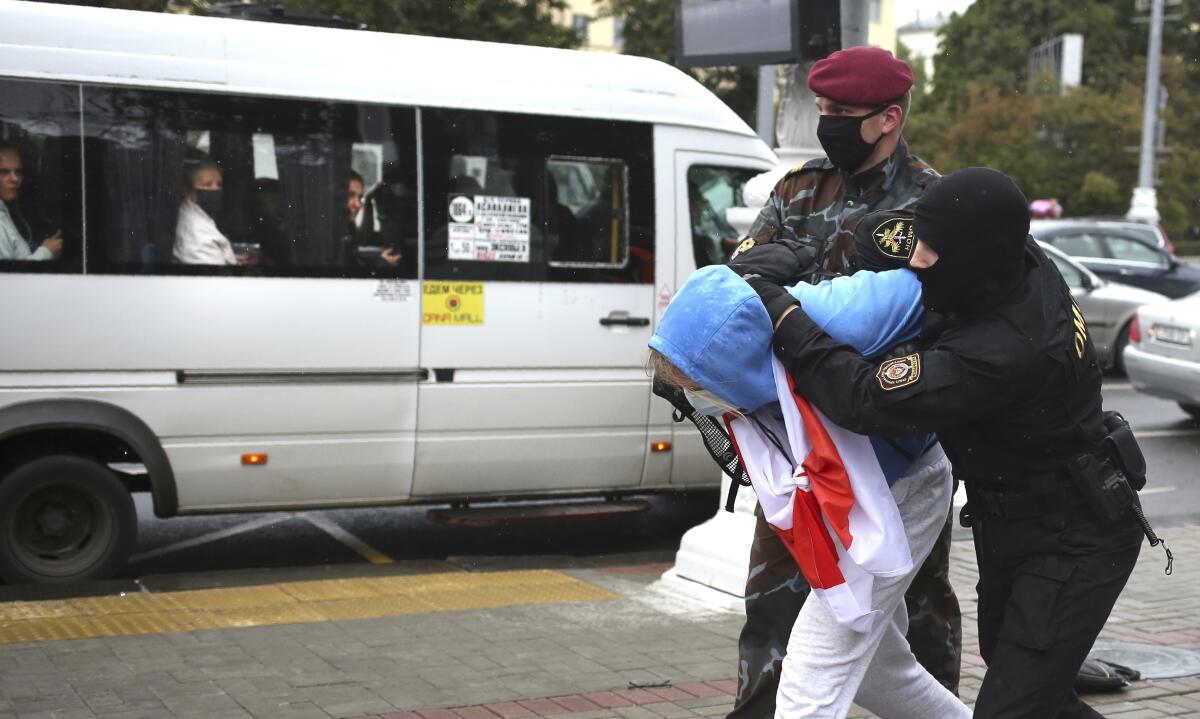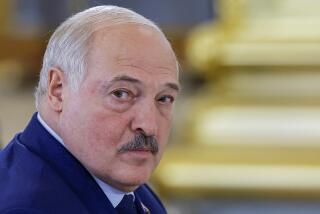Protesters demanding removal of Belarus leader are detained and beaten

- Share via
KYIV, Ukraine — Authorities in Belarus detained scores of university students who took to the streets Tuesday to demand that authoritarian President Alexander Lukashenko resign after an election the opposition has denounced as rigged.
Hundreds of students gathered outside universities across the Belarusian capital, Minsk, and then marched across the city center to the Education Ministry, continuing a fourth straight week of mass postelection protests. The demonstrators chanted for Lukashenko to “Go away!” and held banners demanding freedom for political prisoners.
Police cordons forced the demonstrators to change their route, and officers detained dozens of them, according to the Viasna human rights group. Viasna’s Valiantsin Stefanovich said that some of the detainees were beaten by police.
“Students and universities in general are a highly explosive group,” Stefanovich said in a telephone interview. “The authorities are really scared of strikes starting in universities and are carrying out demonstrative intimidation acts.”
Viasna said at least 62 people were detained, including eight journalists.
One protester, Tatyana Ivanova, said that students from the Minsk State Linguistic University ran into a campus building to avoid being detained, but that police tracked them down there.
“It only fuels protest sentiments,” she said. “The more they beat and detain people, the more people understand that Lukashenko has lost.”
As evening fell, several hundred protesters marched through Minsk and gathered on the main Independence Square. Police let the rally continue but detained several people on the fringes of the square.
Hundreds also rallied in several other districts, forming “solidarity chains.”
Lukashenko, who has run the former Soviet nation of 9.5 million with an iron fist for 26 years, has dismissed protesters as Western puppets.
Since a ferocious crackdown on demonstrators immediately after the Aug. 9 election that drew international outrage, the government has avoided large-scale violence and sought to end the protests with threats and the selective jailing of activists.
Several organizers of strikes at top industrial plants have been detained. On Tuesday, dozens of demonstrators rallied outside the Minsk Tractor Plant to encourage workers to strike, but they were quickly dispersed by police.
Prosecutors have opened a criminal inquiry into the Coordination Council set up by the opposition after the election to try to negotiate a transition of power. Two of its members were given 10-day jail sentences on charges of staging unsanctioned protests, and several others were summoned for questioning.
Amid the official pressure, some opposition activists announced the creation of a new party, Together.
Maria Kolesnikova, a member of the Coordination Council, said the move will help overcome the current crisis. However, the party founders’ call for constitutional changes has stunned some other council members, who argued that it could divert attention from the main goal of pushing for Lukashenko to step down.
Sviatlana Tsikhanouskaya, the main opposition challenger in the election, who fled to Lithuania under pressure from authorities, welcomed the new party but criticized its call for constitutional reform.
“It’s a good idea, just maybe not at the right time,” she said in an interview with the Associated Press, noting that the demands for the release of political prisoners, Lukashenko’s resignation and a new election must now top the protesters’ agenda. “The new party agenda is constitutional changes, and I think this should be done after the elections.”
She warned that Lukashenko’s government shouldn’t hope the protests will lose steam.
“This government must understand that things will never be the same. People want changes,” Tsikhanouskaya said in Lithuania’s capital, Vilnius. “They will not live with this president. They will not obey his orders any longer.”
Observers said the emergence of a new party erodes the opposition’s unity at a crucial moment.
“The creation of a parallel party de facto weakens the opposition, bringing chaos and bewilderment in protesters’ ranks and causing a split among the already-weak leaders,” said Alexander Klaskousky, an independent Minsk-based political analyst. “The party lacks program and its goals look vague. It looks more like an attempt to take the leadership over protests and get rid of political competitors.”
Klaskousky noted that the new party’s call for constitutional reform echoes Lukashenko’s proposals to draft a new version of the constitution — an initiative widely seen as an attempt to win time and steal the protesters’ thunder.
The Belarusian leader has alternated vague promises of reforms with threats and pressure.
On Monday, the authorities denied entry to the Roman Catholic archbishop of Minsk and Mohilev, who was returning to Belarus from Poland. Archbishop Tadeusz Kondrusiewicz strongly criticized the Belarusian police last week.
Lukashenko on Tuesday accused Kondrusiewicz of “delving into politics and dragging believers, Catholics” into it and “receiving orders from Poland.”
The United States and the European Union have criticized the Aug. 9 election that gave Lukashenko a sixth term as neither free nor fair and urged Belarusian authorities to begin a dialogue with the opposition.
Facing Western pressure, Lukashenko has vowed to cement ties with Russia, which has a union treaty with Belarus envisaging close political, economic and military ties. Russian President Vladimir Putin said last week that he stands ready to send police to Belarus at Lukashenko’s request if the demonstrations turn violent but added that there is no need for that yet.
“We will preserve our common Fatherland of two peoples that share one root, the Fatherland that spreads from Brest to Vladivostok,” Lukashenko said, referring to the Belarusian city on the border with Poland, and the Russian Pacific port.
The president bristled at the idea of the opposition taking power in Belarus, alleging it would wage “a massacre” of his allies.
“It wouldn’t be a purge, like some say. It would be a massacre,” he said Tuesday.
The police crackdown immediately after the election left nearly 7,000 people detained, hundreds injured by rubber bullets, stun grenades and beatings, and at least three protesters dead. Police then stopped interfering with the demonstrations, but last week they cranked up the pressure and again started to break up rallies and detain scores of participants.
The government also cracked down on the media, deporting some foreign journalists and revoking the accreditation of many Belarusian journalists. Two Moscow-based Associated Press journalists who were covering the protests were deported to Russia on Saturday. In addition, the AP’s Belarusian journalists were told by the government that their press credentials had been revoked.
U.S. and EU officials have strongly condemned the media crackdown.
More to Read
Sign up for Essential California
The most important California stories and recommendations in your inbox every morning.
You may occasionally receive promotional content from the Los Angeles Times.










